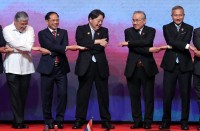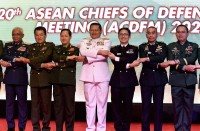Statement of GPH Chief Negotiator Professor Miriam Coronel-Ferrer on the Closing of the 16th Congress of the Republic of the Philippines
3 February 2016
Let me state the fact: The proposed Bangsamoro Basic Law, in whatever shape or form, did not make it out of the 16th Congress.
The sheer indifference and chronic absenteeism of majority of the legislators manifested in the lack of quorum almost on a daily basis in the House of Representatives, and the prolonged and repetitive interpellation of oppositors ate up the remaining sessions.
In the Senate, the intermittent absence of the bill sponsor and the remaining interpellator stalled the deliberation. Moreover, a belated change in procedure was entertained. Only last December 2015, the Senate practically conceded that the Bangsamoro bill is of local application and therefore the upper chamber should have just waited for the House version to be remanded to it.
In all, 40 public hearings and 14 plenary deliberations conducted by the HoR Ad hoc Committee chaired by Rep. Rufus Rodriguez, and 15 public hearings and 14 sessions of plenary interpellations led by local governments committee chair Senator Ferdinand Marcos, Jr. amounted to nothing, along with the millions of pesos of taxpayers’ money used up to finance these drawn-out proceedings.
It is only to be expected that the Filipino people, especially those in the Bangsamoro who had pinned high hopes on this new law, are grieving, hurting, and once again, dreading what tomorrow may bring.
However, the collective inaction of our legislators to complete the deliberation on the BBL did not, and will not, stop the momentum of the Bangsamoro peace process. At this low point, we call for sobriety and perseverance.
The work many among us started and accomplished together through 17 years of hard negotiations and vigorous efforts to jumpstart and move the implementation of the road map cannot be taken away. The Comprehensive Agreement of the Bangsamoro (CAB) remains a signed document that binds the Government of the Philippines and the Moro Islamic Liberation Front to their respective obligations in order to seal the peace through the legal and democratic processes and meaningful social and political reforms laid out in the document.
The CAB duly takes into consideration the diverse interests of different stakeholders in the Bangsamoro region, and provides the guideposts to institute meaningful autonomy and promote social justice through equitable distribution of wealth and political power in Muslim Mindanao – the very same obligations that the 1987 Philippine Constitution mandated Congress to do.
The CAB prescribes the steps and mechanisms for the transformation of conflict-affected areas and MILF camps into secure, productive communities. The agreement also provides for a gradual and phased process of decommissioning of MILF weapons and combatants. It addresses the threat posed by other armed groups and creates the spaces for the convergence of other Bangsamoro claimants such as the Moro National Liberation Front (MNLF) in the new autonomous government envisioned.
The CAB also includes transitional justice and reconciliation measures that will address historical injustices and heal the wounds of war, and remove the biases and prejudices that have created the huge gap in understanding and affection between the Filipino majority and minority populations.
It took a long time to get to this set of practical steps. We need to take away the fear and distrust of the Bangsamoro for our country to become whole. We therefore urge our politicians and fellow citizens to take the time to study the history of the conflict and the peace process so as to get a better understanding of the road map and our unflinching efforts to see it through.
As members of the GPH negotiating panel, we will do everything in the remaining time we have to ensure that the infrastructure for implementing the peace accord are fully functional so that the next administration will be in a good position to carry forward the full implementation of the agreement.
The road map laid out in the CAB remains viable even as we shall now be crafting adjustments in the timeline. (Courtesy OPAPP)








